Key takeaways
- Ethics education at Harvard encourages self-reflection and vulnerability, allowing students to confront their biases and engage deeply with moral dilemmas.
- The combination of rigorous analysis, diverse viewpoints, and open dialogue fosters a community where philosophical ideas become relatable and personally meaningful.
- Key ethical concepts like utilitarianism and deontology are explored through real-life case studies and discussions, emphasizing the complexity of moral decision-making.
- Practical applications of ethics in discussions about corporate responsibility and leadership illustrate how philosophy informs real-world choices and behaviors.
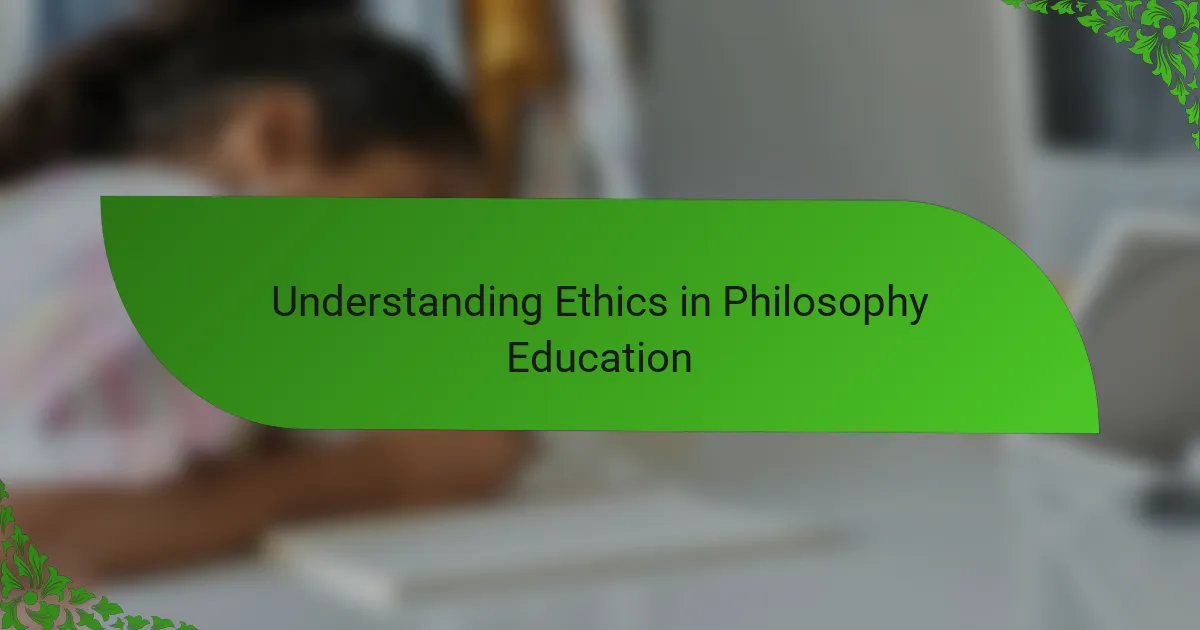
Understanding Ethics in Philosophy Education
Ethics in philosophy education is more than just memorizing rules; it’s about grappling with real questions that challenge our sense of right and wrong. I remember sitting in my first ethics class at Harvard, feeling both intrigued and uneasy—why did some moral dilemmas feel so complicated, even personal?
When we dive into ethical theories, it’s not just about learning what thinkers like Kant or Aristotle said. It’s about examining our own values and motivations. Have you ever paused to ask yourself why a particular choice feels right? That moment of self-reflection often reveals more than any textbook ever could.
In my experience, understanding ethics requires vulnerability and openness. It’s uncomfortable to confront our biases and flawed judgments, but that discomfort is where true learning happens. Isn’t that what philosophy education should be—an invitation to grow, not just to judge?
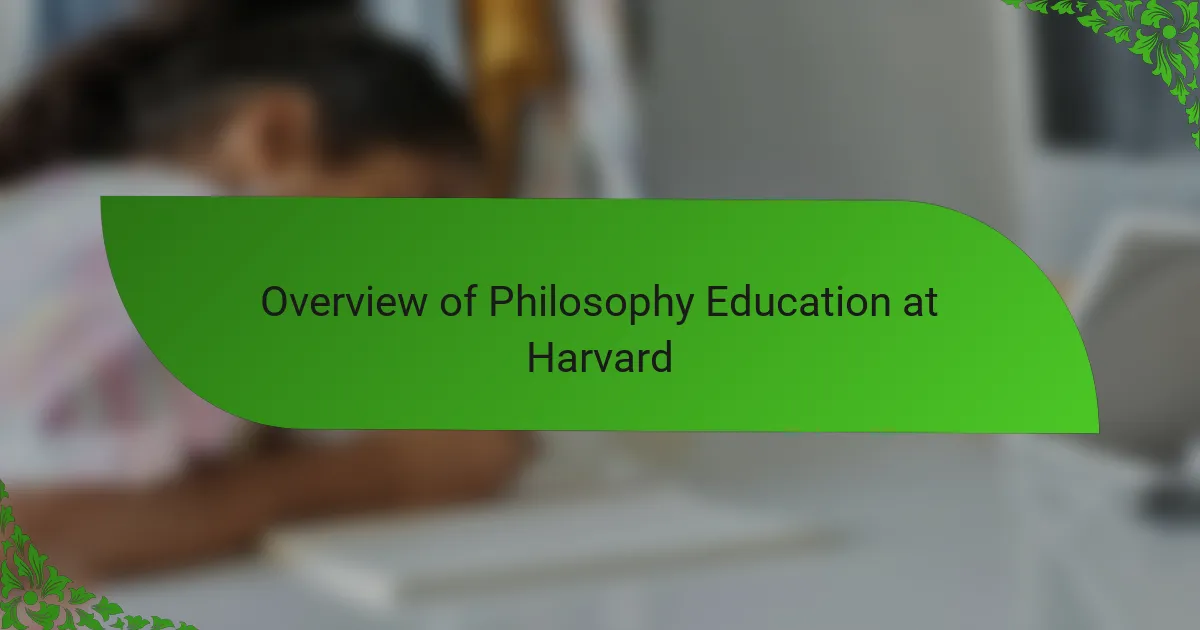
Overview of Philosophy Education at Harvard
Philosophy education at Harvard is a rich tapestry woven from centuries of inquiry, yet it feels remarkably alive and urgent in the classroom. I’ve found that the program encourages you to question not only the big, abstract concepts but also how those ideas touch everyday decisions. Have you ever wondered how centuries-old philosophical debates still shape the way we think today?
The courses strike a balance between rigorous analysis and personal engagement. Sitting in seminars, I was often surprised by how diverse viewpoints sparked debates that felt both intellectually challenging and deeply human. It’s not just about mastering theories; it’s about participating in a conversation that has been ongoing for generations.
What stands out to me is how Harvard’s philosophy education pushes beyond learning—inviting you into a community where questioning is a shared experience. The environment motivates you to connect philosophical ideas with your own life, making the study feel less like an academic exercise and more like a personal journey. Would you expect anything less from a place known for shaping thinkers?
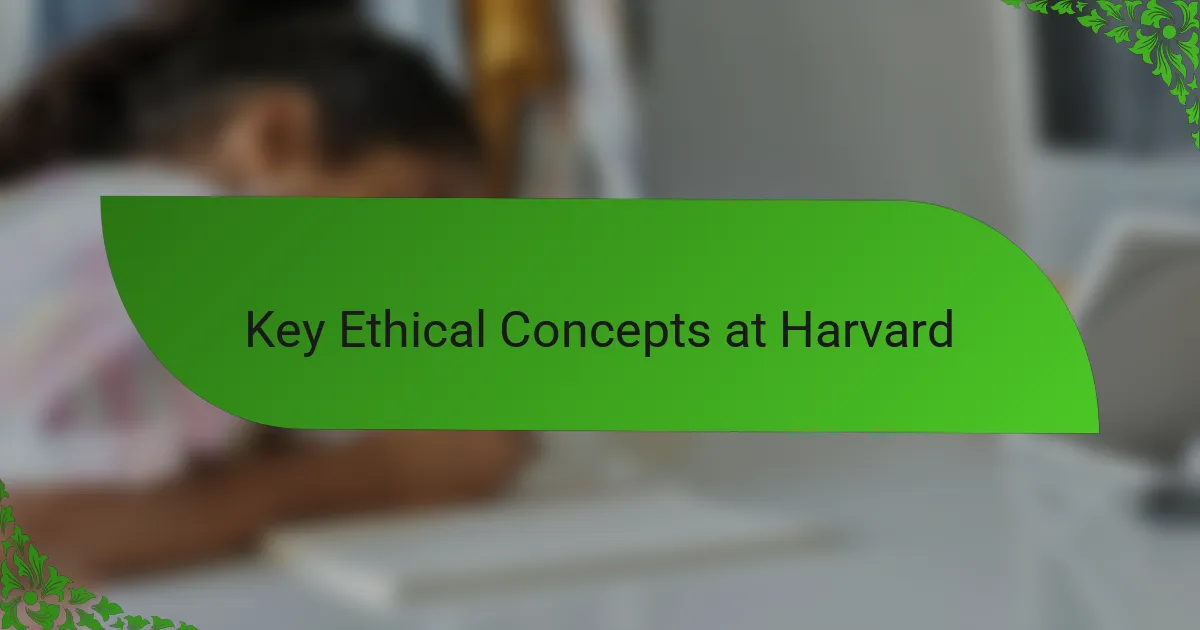
Key Ethical Concepts at Harvard
At Harvard, key ethical concepts aren’t just abstract ideas; they become living questions that challenge you directly. I remember grappling with the principle of utilitarianism during a seminar—trying to balance the greatest good for the greatest number felt simple at first, but quickly grew complicated when real human stories entered the discussion. Have you ever noticed how calculations about happiness can suddenly feel too cold or impersonal?
Another concept that shaped my thinking was deontology, the idea that certain actions are morally right or wrong regardless of outcomes. It forced me to ask, “Is it ever okay to break a rule if the consequences are better?” That tension between rule-following and outcome-based ethics kept the debates vivid and, frankly, a little unsettling at times.
What stays with me most, though, is how Harvard emphasizes ethical humility—recognizing that no single theory holds all the answers. In sessions, I saw classmates argue passionately but always circle back to the idea that ethics is a conversation, not a verdict. Doesn’t that make the study of ethics feel a bit less intimidating and a lot more human?
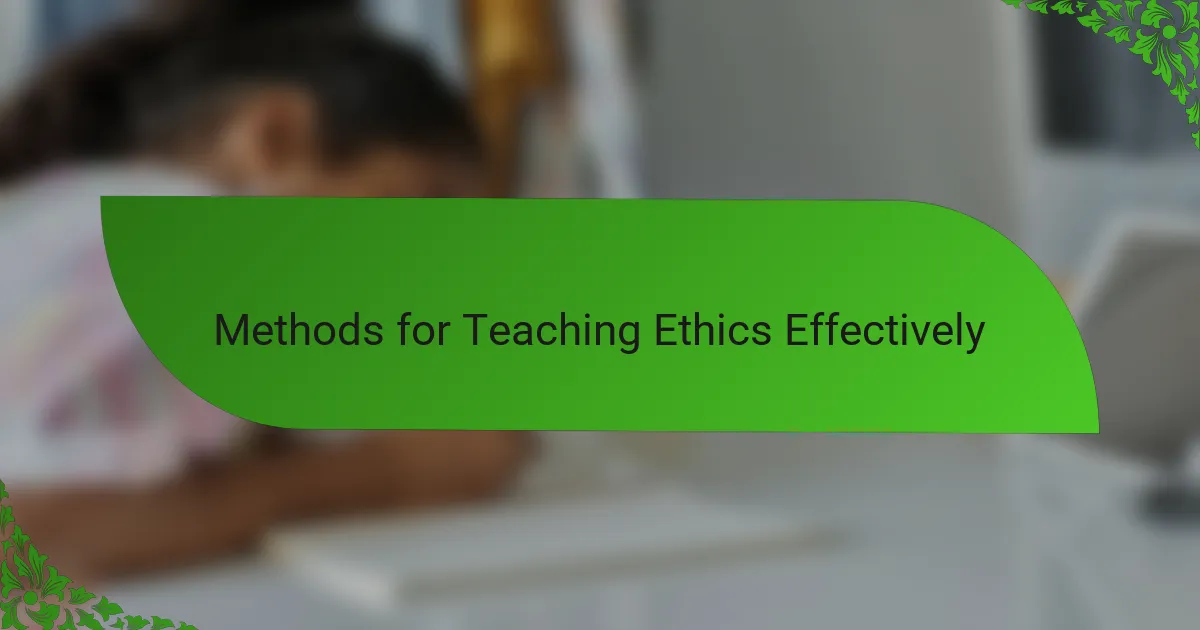
Methods for Teaching Ethics Effectively
One method that stands out to me in teaching ethics effectively is the use of case studies drawn from real-life situations. I recall a class where we dissected a controversial medical decision—it wasn’t just theory anymore; it was about people’s lives. Have you ever noticed how these stories bring ethical principles off the page and into sharp focus?
Another approach that resonates is encouraging open dialogue in small groups. I’ve seen how breaking down barriers in discussion makes room for honesty and vulnerability, where students feel safe to share doubts and contradictions. This kind of engagement transforms ethics from abstract rules into a shared exploration.
I also find that integrating reflective journaling helps deepen the learning experience. When I wrote about my own reactions to moral dilemmas, I uncovered biases I hadn’t acknowledged before. Don’t you think that self-awareness is the key to truly understanding ethics, beyond just intellectual knowledge?
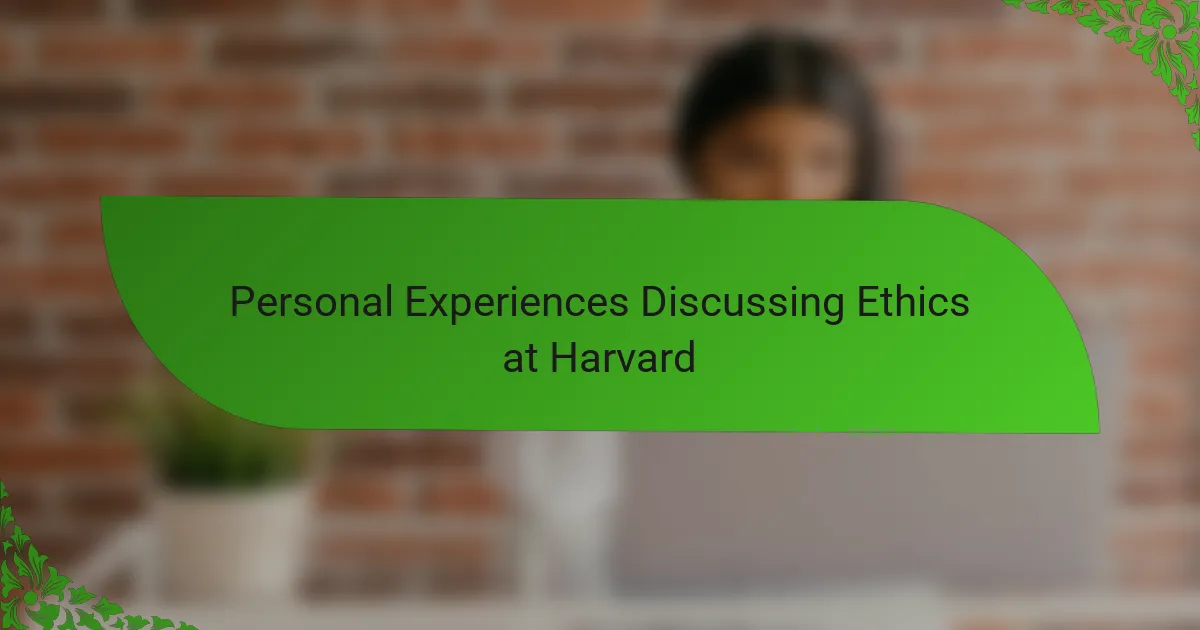
Personal Experiences Discussing Ethics at Harvard
One of my most vivid memories discussing ethics at Harvard was during a lively seminar where a classmate shared a deeply personal story about a moral conflict within their family. That moment shifted the discussion from abstract theory to something profoundly real—how ethics intersects with our lived experiences. Have you ever noticed how a single story can open up an entire room to empathy and new perspectives?
I also recall feeling challenged when I dared to question a popular ethical stance in class. Instead of being shut down, my professors and peers welcomed the debate, pushing me to refine my reasoning and confront my own assumptions. Isn’t it remarkable how a supportive environment can turn doubt into a powerful learning tool?
Sometimes, the most impactful ethical discussions at Harvard happened outside formal settings—over coffee or during late-night study sessions. Those informal talks revealed how grappling with ethics is not just an academic exercise but something that stays with you, shaping how you see the world and your place in it. Have you found that some of your most meaningful conversations happen when you least expect them?
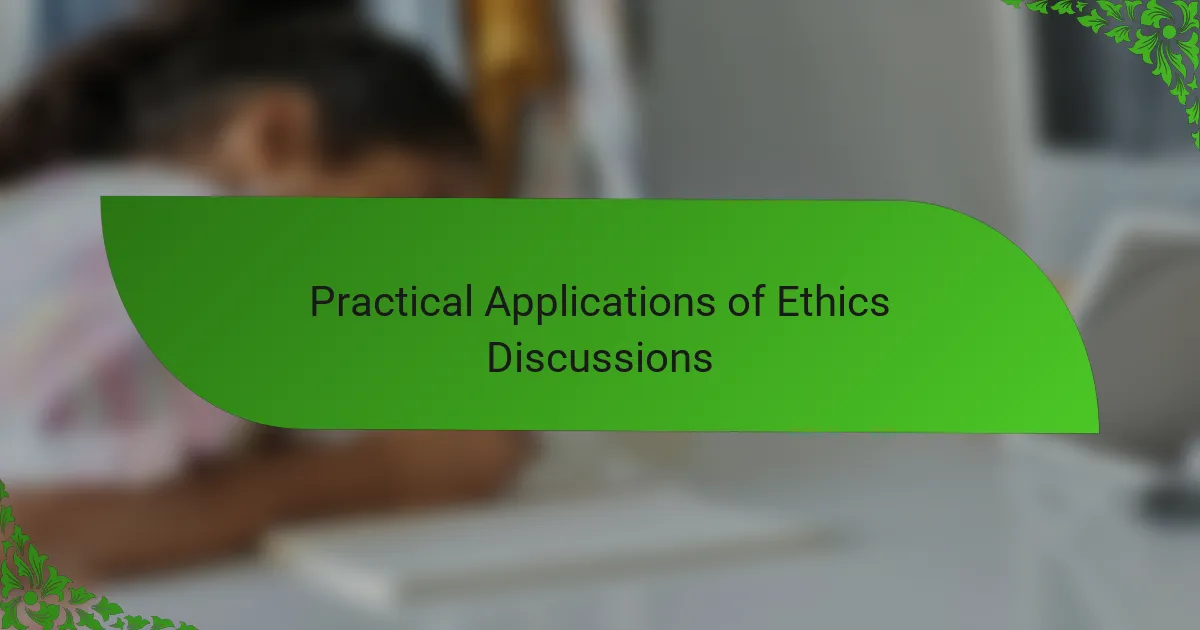
Practical Applications of Ethics Discussions
Ethics discussions at Harvard often move quickly from theory to action, showing how abstract ideas guide real-world decisions. I recall a debate about corporate responsibility where classmates examined a company’s choice to prioritize profits over environmental concerns—not just as an academic puzzle but as a pressing ethical challenge. Have you ever wondered how these ethical frameworks hold up when money and people’s livelihoods are at stake?
Another practical application I’ve seen is how ethics shapes leadership and policy-making. Through simulations and role-playing exercises, we step into the shoes of decision-makers facing moral dilemmas, from public health crises to social justice issues. These scenarios reveal how ethics isn’t about perfect answers but about balancing competing values thoughtfully—something I found both daunting and empowering.
What strikes me most is how these discussions influence personal behavior outside the classroom. After wrestling with questions about fairness and honesty, I noticed myself paying closer attention to everyday choices, like how I handle credit for group work or respond to disagreement. Isn’t it inspiring to see philosophy seep into daily life, making ethics feel less like theory and more like a practice?